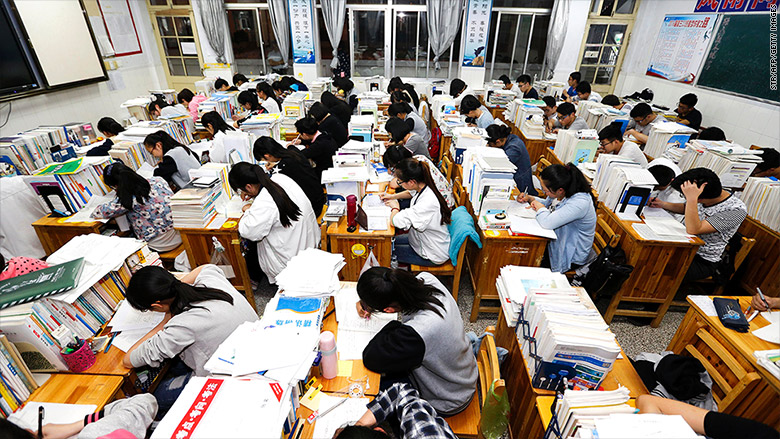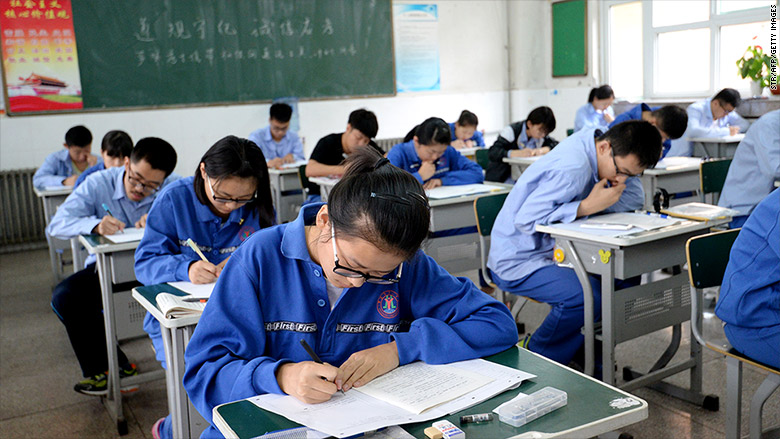
For millions of teenagers, it's a big source of stress. For many businesses, it's a great chance to make money.
More than 9 million high-school students across China are taking the biggest exam of their lives this week. Known as the gaokao, the grueling test determines where the students can go to university and what they'll study.
With so much riding on the outcome, parents are willing to loosen the purse strings to try to ensure success, splashing out on private tutors, good luck charms and even luxury hotels. (The exam lasts two or three days, depending on where the students go to school.)
"Gaokao economics has an extremely large influence," said Professor Ding Yanqing, an associate professor at Peking University's Graduate School of Education. "It affects the majority of families in China."
Hotels raise rates
Hotels near a test center in northwestern Beijing say they are fully booked for the days of the gaokao. The rooms are reserved for students who don't live near the center so they have somewhere to take refuge between the different phases of the demanding exam.

Some hotels jack up their rates for the gaokao. Upmarket ones propose extra pampering to those students who can afford it.
The Shangri-La in Beijing offers its "Way to Success Gaokao Package." For the auspicious amount of 888 yuan (about $130) a night, students can book a room on floors specially reserved for those taking the test. Customers also get a 20% discount on room service and spa treatment, while a limousine service to the test center comes with a 30% discount.
Related: Teen idol joins millions taking China's grueling gaokao exam
Buying academic blessings
Smaller businesses also benefit from the exam.
Wang Jing makes her living by selling ornaments at the Imperial College, a heritage site that for centuries was China's highest seat of learning. She said she's recently seen a marked increase of parents buying wooden tablets inscribed with blessings for academic success.
Related: Why failing the gaokao was the best thing that ever happened to me
Hospital technician Meng Ning was one of many customers lining up to buy one last weekend. She said she wanted to improve her 17-year-old daughter's chances of landing a spot at her dream school.
"We definitely believe in it," Meng said. "And believing in something makes it become true."
Stocking up at pharmacies
Chinese students have also begun spending more on drugs and dietary supplements that they believe will improve their memory and attention.
Huang Yangling, who works at LBX Pharmacy in Beijing, said that in the weeks leading up to the gaokao some parents enter her store hastily searching for medications that will boost exam scores.
"Just today, a student's father came into purchase some Isatis root for gaokao-related reasons," Huang said Saturday. "In reality, it won't have any actual effect unless it's taken over a longer period of time. You can't just eat it for two days and expect a change."
Isatis root is widely used in traditional Chinese medicine. Students often take it ahead of exams in the hope of keeping colds and flu at bay.
Related: Can you pass China's grueling college entrance exam?
Bruce Chen, who's now a student at Peking University, took a U.S. brand of deep-sea fish oil daily for six months prior to his gaokao.
"I think it really had an effect," he said. "It improved my memory, I had more energy, and all of a sudden I felt like I could think more clearly."
He admits it's hard to know for sure whether the fish oil definitely made a difference. But having made it into China's top-ranked university, he's not complaining.
